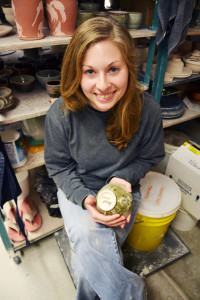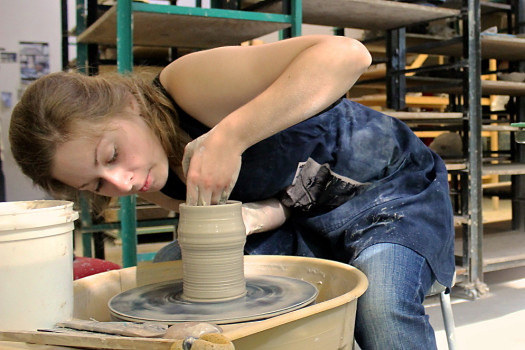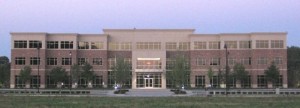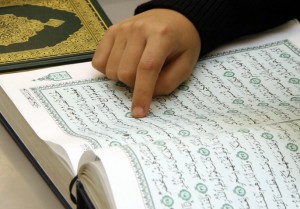On a four-pronged stool, a young woman sits, preparing a ball of clay to be thrown on the potter’s wheel before her. The quiet studio is dusty; the art residue turning afternoon sunlight into a soft, dawn fog. Nodding her approval she centers the clay on the wheel.
 Naomi Woolsey, a Houghton graduate of 2010, has been practicing ceramics in Houghton College’s studio for over 5 years. She did not major in art, but has felt a love for creating ever since she was a child. “Some of my first memories are of playing in the creek here at Houghton when I’d visit my grandparents,” said Woolsey, “I’d make tiny pots out of the creek clay.” She paused, laughing softly, “Things have really come full circle.”
Naomi Woolsey, a Houghton graduate of 2010, has been practicing ceramics in Houghton College’s studio for over 5 years. She did not major in art, but has felt a love for creating ever since she was a child. “Some of my first memories are of playing in the creek here at Houghton when I’d visit my grandparents,” said Woolsey, “I’d make tiny pots out of the creek clay.” She paused, laughing softly, “Things have really come full circle.”
Woolsey is currently the Teacher’s Assistant for Professor Gary Baxter’s ceramics classes including Ceramics 1, Ceramics 2, and Figurative Clay Sculpture. Baxter became acquainted with Woolsey when she took his ceramics classes as a student. He noticed her aptitude for acquiring necessary skills and the joy she derived from creating. Thomas Eckert ‘16, a student in Ceramics 1 this past semester said, “Naomi’s joy is evident from the way she works. That joy is imbued in the pieces she produces.”
When asked about her craft Woolsey explains, “A lot of potters become potters because they fall in love with the material. You’ve got your hands in it. You can really immerse yourself in earth, fire, water, air.” She went on saying, “It records your movement. Even your fingerprint could stay there for tens of thousands of years.”
After graduation Woolsey helped out in the ceramics studio and continued making her pieces. A year later when the TA position became available she was the natural choice. Her responsibilities now include helping students, doing demonstrations, firing the kilns, and constituting glazes. Baxter has been very pleased to work with her and said, “She’s very responsive, willing to help where she can, and reliable.”
While at Houghton, Woolsey studied Theology and Biblical Studies and has used that training in her artwork. In 2012, Woolsey started an online Etsy site because her basement started filling up. Since the foundation of the shop it has grown sustainably. Luminaries – rounded, decoratively porous candle holders – are among her bestselling items. She also specializes in communion sets and liturgical ware.
In addition to these objects, she also produces work on commision. Last year she was hired by a church in Rochester to make a prayer vessel. The church leaders wanted a physical object to be used in the liturgy where written congregational requests could be placed and later incorporated into the pastoral prayer. The main idea to be conveyed by the piece was that God hears our prayers and God’s people hear our prayers.
Woolsey explained, “Thinking about my field in ceramics and imagery in the Bible I created a vessel that brought together the ideas of the golden bowls placed before God in Revelation and the story in Exodus of Moses and the burning bush. Both of these images convey ideas of God hearing prayer and acting on it by enabling a human servant to hear the people’s prayer and act on it.”



